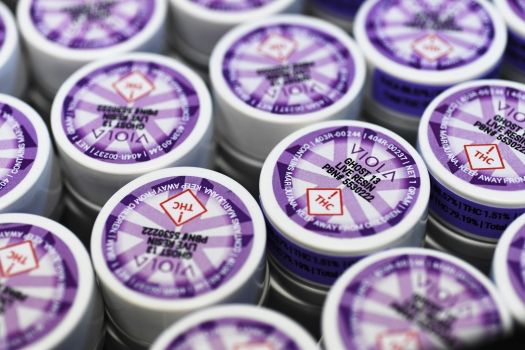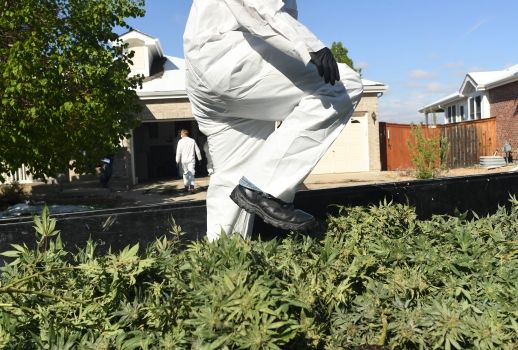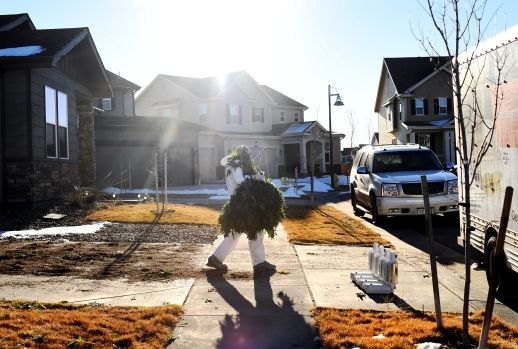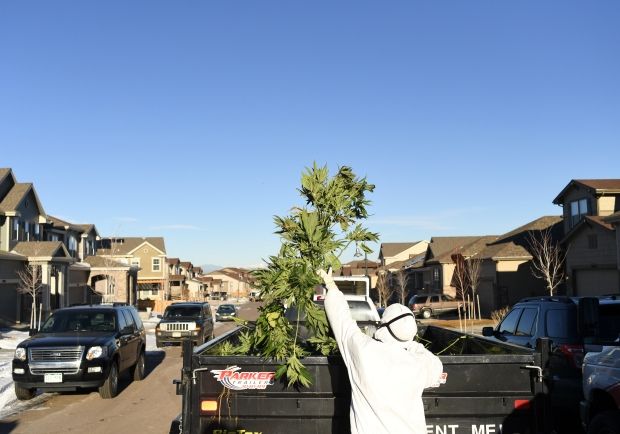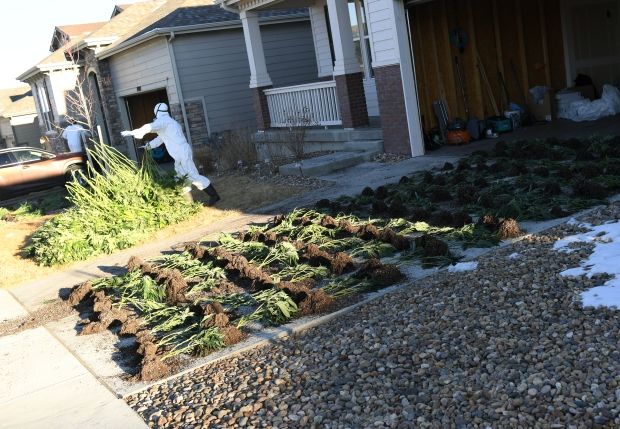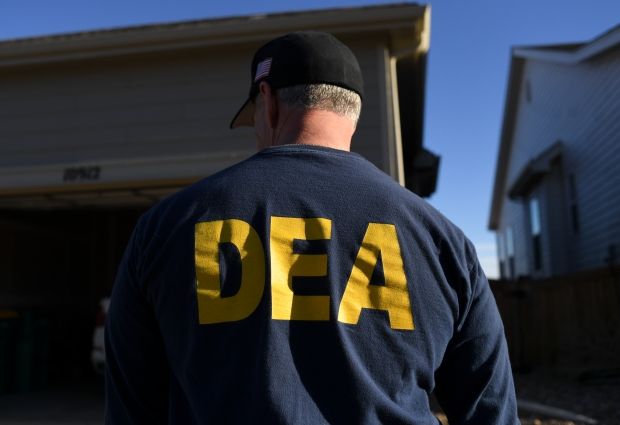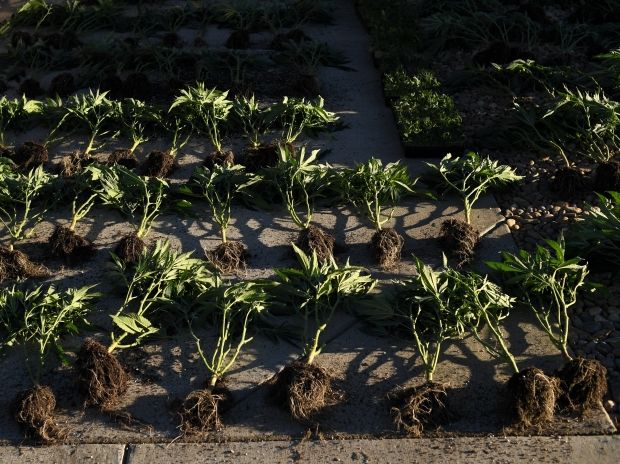Long article but quite the cautionary tale. And remember just a handful of years ago the general view was the sky's the limit for any and all cannabis companies.
Businesses are shuttering or laying off workers as sales have plunged by $700 million.
On Jan. 1, 2014, Iraq War veteran Sean Azzariti made headlines worldwide as the first person in the U.S. to buy legal weed.
More than 10 years later, 3D Cannabis, the dispensary in Denver’s Elyria-Swansea neighborhood where the historic purchase was made, displays a makeshift sign announcing it is “temporarily closed.” The windows and doors on the side of the building have been boarded up. Plastic bags, discarded coffee cups and other trash collect in the corners of the abandoned parking lot.
The dismal state of the historic site is a fitting symbol of the plight of Colorado’s cannabis market. What once was a success story has now left a trail of failed businesses and cash-strapped entrepreneurs in its wake. Regulatory burdens, an oversaturated market and increasing competition from nearby states have all landed major blows, leaving other states with newer marijuana markets scrambling to avoid the same mistakes.
For years, Colorado’s marijuana market minted successful local entrepreneurs who bootstrapped small businesses into national brands. The market drew aspiring cannabis professionals from across the country, whether ambitious college grads with a business idea or investors looking to get in on the green rush.
In 2020, the market soared to $2.2 billion. But just three years later, sales had plummeted to $1.5 billion, leading to layoffs, closures and downsizing. The market downturn has spelled trouble for state finances too: Colorado took in just $282 million in cannabis tax revenues in the last fiscal year, down more than 30 percent from two years earlier.
A messy assortment of factors has led to the pioneering industry’s struggles. A supply glut caused weed prices to plummet in the wake of the pandemic. The spread of cheap, largely unregulated intoxicating hemp-derived products further heightened competitive pressures. And marijuana remains federally illegal, subjecting operators to sky-high taxes and costly regulations.
“It’s like the wind in our cannabis sails in Colorado has just been sucked all the way out,” said Wanda James, founder of Denver dispensary Simply Pure, one of the first recreational dispensaries in the state.
But more than any other factor, Colorado’s market has been sapped by the rapid spread of legalization across the country. Neighbors New Mexico and Arizona are among the 24 states with their own adult-use legal marijuana markets, wreaking havoc on the business plans of dispensaries on Colorado’s southern border. Tourists who once flooded the state for the opportunity to legally experience Rocky Mountain highs have largely disappeared as the novelty has worn off. Even Texans aren’t driving north to buy weed anymore, satisfied with the proliferation of intoxicating hemp products in their own state.
Colorado’s trailblazing cannabis market is now a cautionary tale for states with their own nascent weed programs. A top New York cannabis official recently pointed to Colorado’s dramatic marijuana market downturn to justify regulators’ hesitance to issue too many licenses at once.
“We’re a victim of our own success,” said Jordan Wellington, a partner at Denver-based cannabis policy and public affairs firm Strategies 64. “New markets drawing investment away, new markets drawing purchasing away — all of these different things combined into the soup of the challenges [facing] Colorado.”
Afew dispensary owners in the Mile High City have clung on through the market’s rise and fall.
Greg Gamet, 52, started Dank under the state’s medical marijuana caregiver program in 2009 with $6,000. Like many entrepreneurs who got into the industry in the early days, Gamet did it for the love of the plant. He was already operating as a medical marijuana caregiver, growing weed in his basement, which perfumed his entire house.
When his wife got pregnant, she told him in no uncertain terms to get his grow out of their basement. “Her ballbusting got me to this commercial space,” he says.
Dank is located in an industrial area of Denver’s Park Hill neighborhood. Cannabis consumers have to walk down a long hallway, past an auto shop and an upholstery business, to reach the dispensary at the back of the building. Posters of Bob Marley and botanical cannabis plants decorate the walls.
“The only landlord I could find crazy enough to sign a lease for us to grow weed,” Gamet says of the location. “He hated the government.”
Back in the days when the dispensary was printing money, Dank fed its employees, paid for all of their health insurance costs and even hosted weekly staff parties. Every time a cab driver pulled up to drop off a customer, that cabbie was getting a fiver.
“All that stuff went away,” Gamet says. “You used to run your business and not even worry about budgets … because it was just so much money. How can you screw up 50 percent margins?”
Savvy business owners have managed to survive the downturn, but others have gone out of business or left the state. The number of total cannabis licenses in the state dropped more than 16 percent in the past year alone, according to state data. Cannabis jobs also dropped 16 percent in that same time, according to Vangst’s 2024 jobs report. It was the second straight year of job losses.
Southern Colorado cannabis retailer Maggie’s Farm, which benefited from out-of-state customers, abruptly shut down five of its eight dispensaries earlier this year, while Curaleaf, one of America’s largest cannabis companies, said last January that it had shuttered its production and cultivation facilities in Colorado.
Karson Humiston personally felt the decline as in-person gatherings resumed after pandemic stay-at-home orders.
Humiston moved out to Denver right after graduating college to intern for Gamet in hopes of learning all she could about the industry. Soon, her side hustle that connected job seekers with cannabis industry employers grew so much that she quit the internship to focus on her business full time. Her 2016 cannabis career fair drew huge crowds, putting her business on the map. In 2017, job seekers lined up for hours outside the door.
“It was one of the most successful things we did,” Humiston said. “And then we did it again in 2018. And we did it again in 2019.”
The pandemic put a stop to the large, in-person gatherings. But last summer, with life returning to normal, the team decided to bring back its flagship event.
Not a single company signed up.
“Is something wrong with our sales team?” Humiston joked. She started calling cannabis companies too, who told her they just weren’t hiring.
The growth of Colorado’s cannabis market was still on an upward trajectory when the pandemic hit the U.S. in 2020. Forced to sit at home and armed with government stimulus checks, consumers fueled a boom in weed sales.
Denver initially closed marijuana stores, but public pressure prompted city officials to reverse course and allow dispensaries to stay open.
“We literally sold out in four hours,” says James, of Denver dispensary Simply Pure. “It looked like someone ransacked the place.”
Simply Pure saw its two biggest years during the pandemic, with sales up 60 percent. But that all came crashing down when cultivators thought the pandemic boost would last and increased cultivation capacity, James says.
Wholesale cannabis prices plunged from nearly $1,700 a pound to about $700 a pound, according to Cannabis Benchmarks.
“The only problem … for a long time was that there was never enough weed,” says Jon Spadafora, CEO of Veritas Fine Cannabis, a wholesale cultivator. “It was hard to produce enough to fulfill what the market needed.”
The seemingly ever-increasing demand prompted Veritas to steadily expand its production capabilities. The company was one of the early growers in Colorado to brand their flower products. It inked a deal to be the exclusive grower of Cookies products in the state — one of the most recognizable weed brands in the nation.
But as the country slowly started to return to normal, Colorado’s cannabis market started its precipitous decline.
“We all overestimated the market,” Spadafora says. “We all believed a little bit too much of our own PR.”
The rush to expand cannabis production and the changing dynamics of the pandemic made for a deadly combination of oversupply and price compression. Cultivators invested in expansion, with all their capacity coming online around the same time in 2021, Spadafora explains.
The style of cultivation that Veritas focused on — growing large plants that required a lot of labor — proved too inefficient to compete with other cultivators. In 2022, Veritas downsized — changing its cultivation style, improving efficiency and outsourcing to third parties.
At its height, Veritas had 144 employees. Now, it has 21.
Native Roots followed a similar trajectory. At its Mothership cultivation facility in Denver, the company used to produce about 32,000 pounds of weed a year. By mid-2023, it had cut production by half, says Jason MacDonald, who heads up production.
Production is picking back up, but the company is keeping a careful eye on the market. Part of what helped Native Roots weather the downturn is that it has 21 of its own dispensaries across the state.
“We want to be careful to make sure that we don’t oversupply ourselves,” MacDonald says.
This type of boom-and-bust cycle is to be expected for any state launching a new marijuana market, says Beau Whitney, founder of Whitney Economics, which tracks the cannabis industry. Initially, supply is low and profits are high, which draws in new businesses. As supply and consumer access catch up, prices drop. But there is a reason for newer marijuana-legal states to be cautiously optimistic. As the number of states legalizing cannabis steadily grows, Whitney says, the turbulent pattern of growth and decline should ease as cannabis prices across the country normalize.
While the market in Colorado overall has dropped more than 30 percent from its peak in 2021, sales in counties along the southern border have fallen nearly 50 percent as new markets in New Mexico and Arizona have boomed. Sales in Las Animas County, where Trinidad is located — less than 15 miles from the New Mexico border — have seen the sharpest drop in sales.
But it’s not just the spread of legal weed disrupting Colorado’s market. It’s also how states end up competing on regulations.
New Mexico legalized adult-use marijuana in 2021, with sales launching in April 2022. The state allows adults over 21 to purchase up to two ounces of weed at a time — double Colorado’s 1-ounce limit. Edibles in New Mexico can be produced with higher dosages, too.
Cannabis industry insiders believe New Mexico’s higher purchase limits are drawing residents from nearby states without legal cannabis who used to drive to Colorado to buy weed.
There’s also the added wrinkle of intoxicating hemp cannabinoids. The market for products like Delta-8 THC boomed in recent years as hemp producers figured out how to exploit a loophole in federal laws that allowed them to sell intoxicating products. Since then, many hemp producers have focused on the more lucrative intoxicating products, which aren’t subject to costly state cannabis regulations.
Last summer, Colorado’s Democratic governor Jared Polis signed a bill that severely restricted the sale of such products. But they’re still hurting marijuana sales elsewhere. Demand is higher in states without regulated marijuana. The market in Texas alone is worth $2 to 3 billion, according to a report from Whitney Economics. That’s about 50 percent larger than Colorado’s legal marijuana market.
“When you can buy [intoxicating hemp] products online with a credit card, click the ‘Subscribe and Save’ button so that it’s at your door every two weeks in a discreet package, and you’re not getting carded … why wouldn’t you want to buy online?” says Liz Zukowski, director of public affairs for Native Roots.
Colorado cannabis industry officials say the state’s onerous regulations and high taxes don’t allow them to compete with neighboring states, let alone the burgeoning hemp market. Seed-to-sale tracking, contaminant testing, license renewals, employee badge renewals — all of these regulations are costly to cannabis businesses.
Native Roots has 21 dispensaries across the state, most of which have both medical and recreational licenses. Those licenses come up for renewal separately every year, and there’s no way for the company to renew their licenses together at the same time.
But a bill introduced by Republican Sen. Kevin Van Winkle and Democratic Sen. Julie Gonzales would fix that, along with other regulatory burdens facing the industry like a requirement to use radio frequency identification tags for plant tracking. Polis signed the bill Wednesday.
“We want to look at the house we built 10 years ago and redesign it,” Van Winkle says, “especially when it comes to public safety.”
But that doesn’t address the high cannabis tax rates that rankle the industry. There’s a 15 percent excise tax on both wholesale and retail, which doesn’t account for local taxes. Because cannabis taxes were set by voters at the ballot box in the state’s 2012 legalization amendment and earmarked for school infrastructure projects, lawmakers are limited in what they can do to change them.
"[With] the decline of revenues we’re now having to cut back on these very good programs,” Van Winkle said.
Marijuana’s continued federal illegality is another added cost.
“280E is
the biggest problem with the industry by far,” Gamet says, citing a federal tax code that prevents cannabis businesses from taking typical business deductions. “I’m very familiar with that because I’ve been audited every year since 2014. It’s a lot of lawyer expenses.”
It’s not that you can’t make money in the Colorado market anymore, says Chris Woods, CEO of Terrapin Care Station, which started as a medical cannabis operator in Boulder in 2009.
When it comes to maturing cannabis markets, “you always see the inflection points where you’re either going to have to double … your footprint in order to make money in terms of an economy of scale or take out additional capital to kind of deal with the market trends,” he says.
Instead, Woods decided to pull out of the Colorado market entirely, selling its five remaining retail licenses. The company will continue to be based in Colorado, where Woods lives. But going forward, the business will be focused on Pennsylvania — which only has a medical program but seems poised to transition to adult use.
“The size of our business in Pennsylvania is like three, four times the size of what it is in Colorado,” Woods says.
For all the troubles that the Colorado cannabis market has endured, the state’s early foray into legalization has produced successful entrepreneurs — some of whom have expanded far beyond their home state’s borders.
If the now-defunct 3D Cannabis is a symbol of Colorado cannabis’ rise and fall, Wana’s Boulder production facility showcases the state’s lasting influence in the nation’s still-nascent weed industry.
Nancy Whiteman started Wana in 2010 with a focus on making cannabis-infused edibles, eventually deciding to specialize in gummies. At a time when other players in Colorado’s cannabis industry were downsizing or scaling back, Wana’s production facility in Boulder upgraded its kitchen. Now, the gummy production facility boasts the latest technology from the confectionery industry — a huge upgrade from staffers hand-mixing in pots.
For years, Whiteman was the sole owner of Wana, which netted her a windfall thanks to a deal with Canopy Growth, a large Canadian cannabis producer.
The deal was worth a total of $350 million. Canopy initially paid Whiteman $297.5 million for 85 percent of the company, essentially purchasing the option to buy Wana. It catapulted her onto a
Forbes ranking of successful businesswomen. This month, on the heels of the Biden administration announcing plans to reclassify cannabis, the deal closed and Whiteman got the rest of her payout.
Whiteman recently announced that she would step down from her leadership role at the company and become a board member of Canopy USA. Wana Chief Marketing Officer Joe Hodas will take the reins as president this month.
The company has expanded to 17 states and Puerto Rico, and now has its sights set on Europe.
“Part of establishing our beachhead here early meant that, when people would come to visit, they would take product home with them,” Hodas says. He recognizes that the company would not have achieved its scale and reach without its early entry into the first legal cannabis market in the nation.
“On a standalone basis, we’re still very successful here.”
